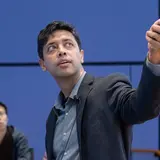
Ahmed Mushfiq Mobarak
Jerome Kasoff ’54 Professor of Management and Economics
Mushfiq Mobarak is the Jerome Kasoff ’54 Professor of Management and Economics at the Yale School of Management, jointly appointed with the Department of Economics. He is a development economist, and the founder and faculty director of the Yale Research Initiative on Innovation and Scale (Y-RISE).
Professor Mobarak conducts field experiments exploring ways to induce people in developing countries to adopt technologies or behaviors that are likely to be welfare improving. He also examines the complexities of scaling up development interventions that are proven effective in such trials. His ongoing research projects are in Bangladesh, Brazil, Chile, India, Kenya, Nepal and Malawi. His research has been published in journals across disciplines, including Econometrica, Science, The American Economic Review, the American Political Science Review, Marketing Science, and Demography, and covered by the New York Times, The Economist, the BBC, the Washington Post, Foreign Policy, Der Spiegel, and other media outlets around the world. He is collaborating with governments and NGOs in Bangladesh, India, Nepal, Pakistan and Sierra Leone to devise evidence-based COVID response strategies, and distribute facemasks to over 100 million people based on the results of the NORM model.
Professor Mobarak has held other positions at the World Bank, IMF Innovations for Poverty Action, J-PAL at MIT, and the International Growth Centre at LSE. He teaches “State & Society” in the SOM core curriculum and a Ph.D. field course in Development Economics.
Education
- PhD, University of Maryland at College Park, 2002
- MA, University of Maryland at College Park, 1999
- BA, Macalester College, 1997
Articles
To Use Financial Incentives or Not? Insights from Experiments in Encouraging Sanitation Investments in Four Countries
The Productivity Consequences of Pollution-Induced Migration in China
Last-Mile Delivery Increases Vaccine Uptake in Sierra Leone
Refugees are Hosted in Highly Vulnerable Communitie
Returns to International Migration: Evidence from a Bangladesh-Malaysia Visa Lottery
Migration and Resilience during a Global Crisis
The Welfare Effects of Encouraging Rural - Urban Migration
Social and financial incentives for overcoming a collective action problem
Why Did COVID-19 Vaccinations Lag in Low- and Middle-Income Countries? Lessons from Descriptive and Experimental Data
Working Papers
Economic Drivers of State Violence against Civilians: Evidence from Myanmar
Is Habit a Powerful Policy Instrument to Induce Prosocial Behavioral Change?
Restrictions on Migration Create Gender Inequality: The Story of China’s Left-Behind Children
Demand Estimation with Strategic Complementarities: Sanitation in Bangladesh
Slippery Fish: Enforcing Regulation under Subversive Adaptation
Effects of Emigration on Rural Labor Markets
Selected Media Coverage
We conducted the largest study on masks and covid-19: They work
The Washington Post
September 9, 2021
COVID vaccines have higher approval in less-affluent
Nature
July 22, 2021
Saving Lives Saves Livelihoods
Foreign Policy
March 9, 2021
Bangladesh experiments with a new approach to poverty alleviation
The Economist
January 25, 2018
This Country Fought Ebola. It May Beat Another Disease.
New York Times
June 16, 2020

Achievements
Top 20 Clinical Research Achievement Awards, The Clinical Research Forum, 2023
Named to Vox.com’s Inaugural “FuturePerfect 50 List” which honors “50 scientists, thinkers, scholars, writers, and activists building a more perfect future”, under “Fighting Global Poverty and Injustice,” 2022
Excellence in Refereeing Award, Review of Economic Studies, 2022
